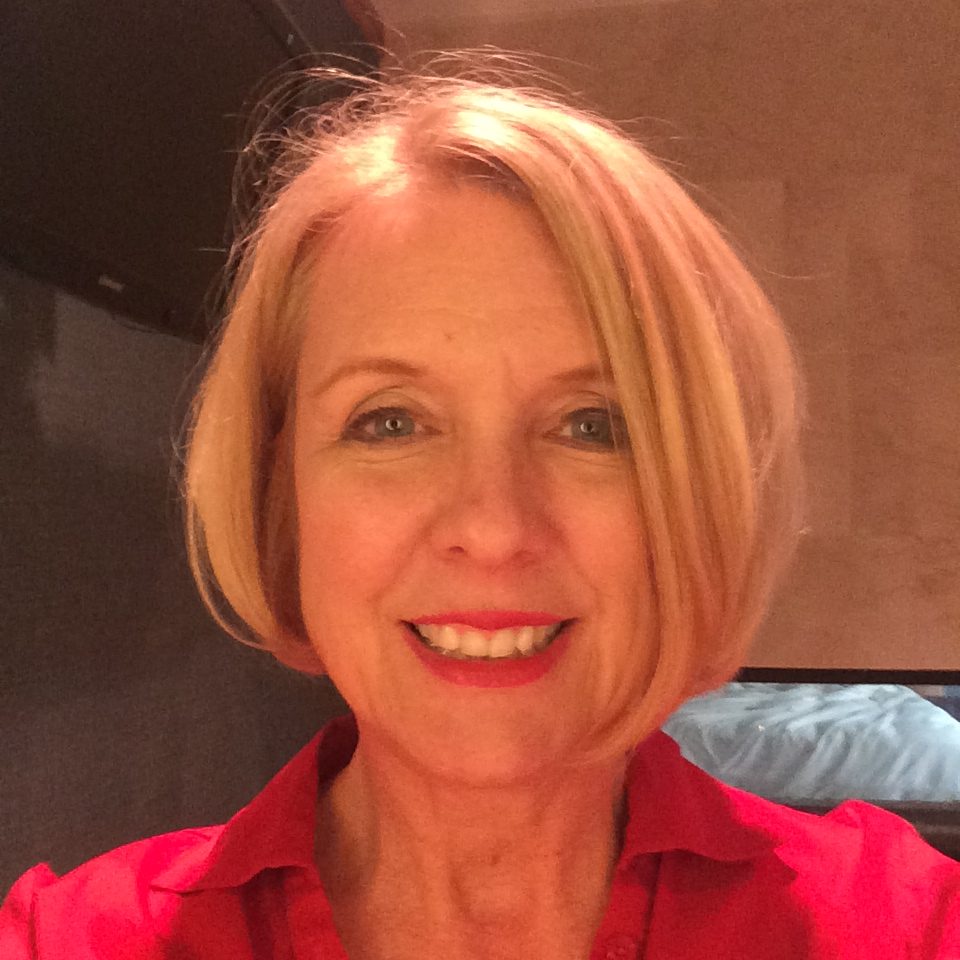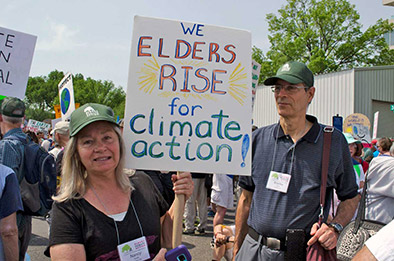Every Monday morning for nearly a year, Judy Sherry, 82, has called the office of her senator, Roy Blunt (R-Missouri), with the same question: When is he going to get the courage to do something about gun violence?
“He’s retiring soon, for God’s sake,” she said.
Those weekly calls seemed to make no difference, but that hasn’t deterred Sherry. As founder and president of Grandparents for Gun Safety, she calls, writes, marches, speaks to groups and fields TV interviews—anything to get the message out for commonsense gun control.
“All people have the right to feel safe from gun violence in their communities,” she said.
The impact of activists like Sherry is likely to grow, as more than a million people 55 and older join the ranks of the retired each year in the United States. Like Sherry, these older activists come armed with their own superpowers: lifetimes of experience, a supply of available time and a sense of perspective that strengthens them for the long game.
“From marching to improving road safety; from envelope-stuffing to making calls; from being arrested to circulating petitions; from fundraising to letter writing; from cooking in a community kitchen to starting an urban farm—for these people, it is not too late to try to save the world,” wrote Thelma Reese and BJ Kittredge, coauthors of How Seniors are Saving the World: Retirement Activism to the Rescue! (2020).
A Quiet Force
Media attention tends to spotlight young activists like Greta Thunberg, a teen climate change activist, or Malala Yousafzai, who won a Nobel Peace Prize at age 17. Older activists who’ve worked in their communities for years are often overlooked, according to Loretta Graceffo, a correspondent for the media watchdog group Fairness & Accuracy in Reporting.
“By devaluing the wisdom and experience of elders in favor of uplifting a handful of teen activists for clicks, [the] media underplay the collective power that can come from intergenerational cooperation,” she wrote.
Older activists may not create the same media splash, but they’re a quieter, more effective force, said Tommy Steed, 73, chairman of the Association of BellTel Retirees. The nonprofit works to protect the pensions and benefits of retirees from Verizon and the original Bell System.
Steed contrasts his current role to his rowdier approach as a union steward in his 20s. Back then, he relished tangling with the police on picket lines. Now, his approach is more low-key. Steed partners with fellow retirees, many of them former managers who once sat on the opposite side of the bargaining table.
“Older activists are stoic and strategic,” he said. “We’re quiet, but that’s how to be effective. Younger activists are a mob scene for the media. They make a lot of noise. We don’t want to make a lot of noise; we want to be effective.”
A Wealth of Experience
Older adult activists often bring a more nuanced perspective and broader knowledge of communities. As Graceffo wrote, “With age often comes access to institutional infrastructures and financial resources, as well as a deeper understanding of history.”
“We’ve had more time to make mistakes than younger activists,” said John Fullinwider, 70, a lifelong community organizer in Dallas and co-founder of Mothers Against Police Brutality. “Sometimes you can see the problems with greater depth after you’ve had longer experience with them.”
Fullinwider points to historic victories that most people now take for granted: the abolition of slavery, the 40-hour work week, women’s right to vote.
His advice: “Never lose your youthful idealism. Pace yourself for the long-distance run. You lose until you win. It’s good to have that sense of history about it.”
I’ve learned that you don’t bury your head like an ostrich. You get out there and deal with it.
—Karlin Chan
Wisdom and experience empowered Karlin Chan to act when Asian Americans in the Chinatown neighborhood of New York were targeted during the pandemic. He started a block watch group to patrol neighborhoods. Having lived in Chinatown for more than 60 years and worked as a community organizer for decades, Chan has connections throughout the city and with the New York City police department.
“Hate crimes have been around here since I was a kid,” he said. “I’ve lived the history, and I’ve learned that you don’t bury your head like an ostrich. You get out there and deal with it.”
For Sherry, being strategic means patience—staying realistic about what can be accomplished immediately while taking small steps in the meantime. After learning that many gun-related deaths are due to accidents or suicide, her organization started Lock It for Love. They’ve distributed more than 5,000 free, high-quality gun locks at community events.
Yes, Sherry said, she’d like more sweeping reforms, but until then, she’s convinced the gun locks have saved lives.
“Clearly, we have saved someone from suicide, or some little kid from picking up an unlocked, loaded gun,” she said.
Inspired by the 1960s
Unlike their Greatest Generation predecessors, many of today’s generation of older adults came of age during the Vietnam War era in the 1960s. For some, it sparked a lifetime of activism. For others, that formative time created an emotional connection that has lingered, even if career and family obligations limit their ability to stay in the fight.
The Vietnam era is very much intertwined in the story of Henry Stoever’s activism. His father was forced to join the Nazi war effort after attempting to immigrate to the United States in the 1930s. Stoever was born in Germany in 1948; his family came to the United States in 1951. Stoever grew up enduring taunts from kids who called him “Adolph” and watching stories about the Holocaust on Walter Cronkite’s Twentieth Century documentaries. When war was in the news in the1960s, Stoever worried that Americans “were the Nazis in Vietnam.”
Those formative experiences led to Stoever’s lifelong work in peace activism. Since 2003, Stoever has stood at the same street corner in Kansas City, MO, every Tuesday, waving a sign that reads, “Imagine a world free of nuclear weapons.” Along with other local activists, he’s been arrested numerous times for trespassing during protests at a nuclear weapons plant; recently he was convicted and faces a trial in September. He’s looking forward to making his case to the jury.
In talking about his work, Stoever seems immune to despair, even if his efforts haven’t led to significant changes.
When the news is upsetting, activism can ease a sense of despair.
“My activism comes from a deep caring for others,” he said. “Activism is a sign of hope, faith and love.”
As a teen, Lauren Mayer canvassed for presidential candidate George McGovern, spurred by her fears for her older brothers, who were eligible for the draft. Today, at 63, Mayer is earning a living as a songwriter in the Los Angeles area but finds ways to contribute when she can. Inspired by the protest singers of the 1960s and early 1970s, she created her own twist for the digital age. She writes and records a new song every week, offering her sassy take on issues ranging from reproductive choice to climate change to LGBTQIA+ rights. Some 20,000 people follow her on YouTube and Facebook.
“I don’t sing as well or look as cute as I did when I was younger, but I think my writing is better because I have so much more life experience,” Mayer said.
Mayer performs at rallies and donates the use of her songs for fundraisers for groups like the Raging Grannies, a network of older protesters.
“The news these days is often so upsetting that people feel paralyzed,” she said. “For me, this project completely eases my sense of despair.”
Time to Devote
Another key advantage that older activists bring to their causes: time. Once they’ve reached their 60s or 70s, many have paid off the mortgage and the kids’ college tuition. They can afford to retire or work fewer hours.
Arch Mayfield, 73, still works part time as a writing instructor at Texas Christian University in Fort Worth. He’s involved in helping support refugees in the community through his church. When US immigration officials began separating children from their families at the border, he began standing at a street corner with a few other activists once a week, holding signs showing children in cages.
During elections, Mayfield serves as an election judge, working shifts that start at 5:30 a.m. and continue until the polls close. (Every election in his county requires a set of election judges and clerks to represent both the Democratic and Republican parties.) The work pays a small stipend, but younger people with children and full-time jobs usually can’t step in.
“I see that involvement as a way of countering voter suppression and to help ensure the widest possible participation,” he said.
Once you open your eyes to injustices, it’s hard to be happy without doing something about it.
—John Fullinwider
Bill Holston, 66, spent the first 30 years of his career in commercial law in Dallas. In the late 1980s, he took on a pro bono case representing an immigrant seeking asylum in the United States.
“I fell in love with the work,” he said. “As I represented more and more people, I developed a greater and greater passion for the rights of the people I was representing.” Ten years ago, he closed his commercial law practice to become executive director of the Human Rights Initiative of North Texas.
Holston says he’s inspired by John Lewis, the US congressman and civil rights activist who continued to get into “good trouble” until his death at age 80. As he gets older, Holston thinks more about his legacy. He’s more focused on “eulogy virtues,” citing New York Times columnist David Brooks, who wrote: “The résumé virtues are the skills you bring to the marketplace. The eulogy virtues are the ones that are talked about at your funeral—whether you were kind, brave, honest or faithful.”
With that change in focus, Holston said, he has a more long-term view.
“The older you are, the more wired you are toward persistence,” he said. “I’ve been doing this a long time, and I’m going to keep doing this as long as I’m physically and mentally capable.”
For many activists, their work also brings a sense of purpose and meaning.
Activism “is a good way to live your life,” Fullinwider said. “What kind of life is it to just enjoy your advantages and buy things and then die? Once you open your eyes to injustices, it’s hard to be happy without doing something about it. Most people have a conscience. When you listen to it, your life will be better, and you have a chance to make life better for others.”
A Good Start
Judy Sherry’s weekly calls to Roy Blunt may have made some difference after all. Blunt was one of 10 Republican senators who helped hammer out a bipartisan deal on a narrow set of gun safety measures announced on June 12. However, the deal didn’t include other basic measures, like expanded background checks or limits on assault weapons.
“It is a good start, but that’s all,” she said.
Sherry jokes that she sometimes wishes she’d chosen a cause she’ll live long enough to see solved. But she remains convinced that gun violence will ultimately be addressed.
“We’ve changed cultures before,” she said. “We’ve changed smoking. We’ve changed seatbelts. We’ve changed drinking. We didn’t ban cigarettes or cars or alcohol, but we figured out a better way to deal with it, and we will do that here.”

Freelance writer Mary Jacobs lives in Plano, TX, and covers health and fitness, spirituality, and issues relating to older adults. She writes for the Dallas Morning News, the Senior Voice, Religion News Service and other publications; her work has been honored by the Religion Communicators Council, the Associated Church Press and the American Association of Orthopaedic Surgeons. Visit www.MaryJacobs.com for more.



